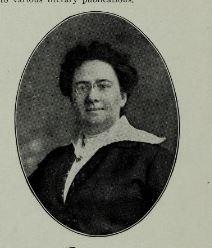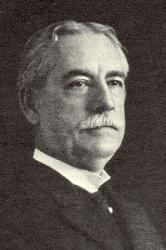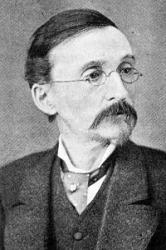Planning worship?
Check out our sister site, ZeteoSearch.org,
for 20+ additional resources related to your search.
- |
User Links
Person Results
Birdie Bell

Meter: 9.8.9.8 D Author of "I'm Standing On The Rock Of Ages" in The Cyber Hymnal C. Louise Bell, also known a Birdie Bell, was born, raised and lived in New York city. She began writing hymns when she was sixteen years old. She is the author of more than 500 hymns, 200 religious poems, and 200 Christmas and Easter lyrics, as well as short stories, and articles. She wrote under the name of Birdie Bell, which is what her family called her.
Dianne Shapiro, from "The Singers and Their Songs: sketches of living gospel hymn writers" by Charles Hutchinson Gabriel (Chicago: The Rodeheaver Company, 1916)
Birdie Bell
Donald Murphy
Meter: 9.8.9.8 D Arranger of "RENDEZ À DIEU" in Celebrating Grace Hymnal
Donald Murphy
Henri Chapieu
Meter: 9.8.9.8 D Translator of "Bread Of The World" in The Hymn Book of the Anglican Church of Canada and the United Church of Canada
Henri Chapieu
Marlys Swinger
Meter: 9.8.9.8 D Composer of "[Now come, in love to you we're giving]" Marlys Swinger is a published author and an editor of children's books. Some of the published credits of Marlys Swinger include Sing Through the Seasons: 73 Songs for Children, Sing Through the Day: Eighty Songs for Children - with CD, Sing Through the Day.
--http://www.jacketflap.com
Marlys Swinger
Gerardo C. C. Oberman
b. 1965 Person Name: Gerardo Oberman, b. 1965 Meter: 9.8.9.8 D Translator of "New Songs of Celebration Render (Nuevas canciones entonamos)" in Santo, Santo, Santo
Gerardo C. C. Oberman
B. C. Unseld

1843 - 1923 Person Name: Benjamin Carl Unseld Meter: 9.8.9.8 D Composer of "UNSELD" in The Cyber Hymnal Benjamin Carl Unseld, 1843-1923
Born: October 18, 1843, Shepherdstown, West Virginia.
Died: November 19, 1923.
Buried: Elmwood Cemetery, Shepherdstown, West Virginia.
After leaving school at age 14, Unseld worked as a clerk in a country store. He received his first musical instruction around age 15, from a companion who had attended a singing school. He was shown the representation of the scale in the old Carmina Sacra, and had it sung for him. At the friend’s suggestion, he got permission from his pastor to practice on the church organ. Since both boys worked, their only chance to practice was after the store closed at 9:00 p.m., and occasionally at noontime. They went to the church together and took turns, one at the keyboard and the other at the bellows.
Shortly after the Battle of Antietam in September 1862, some of which Unseld witnessed, he left home and became a bookkeeper in the general offices of a railroad in Columbia, Pennsylvania. He sang in a choir, and gained further practice reading music. He rented a melodeon and spent much time in his room improvising on it. He bought a copy of Woodbury’s Harmony and Musical Composition, and studied it as well as he could without a teacher. He accepted an invitation to play the organ in the local Methodist church, on the condition that he received the tunes early in the week so he could learn them. This was his first position as an organist.
In the spring of 1866, he entered the Musical Institute in Providence, Rhode Island, conducted by Eben Tourjée (founder of the New England Conservatory in Boston, Massachusetts, and father of Lizzie Tourjée). There he studied voice, piano, organ, and harmony. After learning of Unseld’s business experience, Dr. Tourjée made him secretary of the school; in 1867, Unseld became the first secretary of the New England Conservatory.
Starting in 1870, Unseld attended schools led by Theodore F. Seward. There he met George Webb, Lowell Mason, James McGranahan, Charles Case, and other notables in the music community. In 1874, Unseld taught at Fisk University in Nashville, Tennessee, and helped train Fisk’s Jubilee Singers for their European trip. In 1877 and 1878, he was organist and choir master at St. James’ Episcopal Church, Lancaster, Pennsylvania.
In 1879, Unseld moved to New York City, and for 15 years taught, led choirs, composed and published. In New York, his musical headquarters was the publishing house of Biglow & Main Company, where he was in almost daily contact with the popular composers and teachers of the day: Ira Sankey, Horatio Palmer, Hubert Main, Robert Lowry, et al. In 1894, Unseld moved to Cincinnati, Ohio, and worked as an editor for the Fillmore Music House. In 1898, he moved to Dayton, Ohio, and worked in a similar capacity for the Lorenz Publishing Company. He moved back to New York City in 1901, then to Hagerstown, Maryland in 1905. He and his wife Sallie were apparently living in Tennessee as of 1920. Unseld’s works include:
The Choral Standard (New York: Fillmore Brothers, 1895)
Progress in Song, with E. T. Hildebrand (Cincinnati, Ohio: The Fillmore Brothers Company)
Unseld was inducted into the Southern Gospel Music Association Hall of Fame in 2004.
Sources--
Hall, pp. 239-44
Music--
Ancyra
Euphemia
He Is Risen
Hordville
Make Haste!
Meschach
Twilight Is Falling
Unseld
Wonderful Message
--www.hymntime.com/tch
B. C. Unseld
David Emlyn Evans

1843 - 1913 Person Name: D. Emlyn Evans Meter: 9.8.9.8 D Composer of "EIRINWG" in Old and New Welsh and English Hymns Born: September 21, 1843, Penralltwen, near Castellnewydd Emlyn (Castle Emlyn), Carmarthenshire, Wales.
Died: January 19, 1913, Cemmaes, Montgomeryshire.
Buried: Llandyfriog (near Newcastle Emlyn), Wales.
Evans was a composer, adjudicator, conductor, editor, critic, music historian and entrepreneur. Frequently irascible, especially in his last years which he spent in severe and immobilizing pain, he was one of the foremost figures in Welsh musical life in the period leading up to World War I.
He was self taught, via the most popular of all Welsh music publications, John Mills’ Gramadeg Cerddoriaeth, and the two parts of Thomas Williams’ Ceinion Cerddoriaeth (Musical Gems, 1852) with its 200 hymn tunes and seventy anthems and choruses. Later, formal lessons by a music teacher, Mr. Hughes of Llechryd, a few miles from his home, gave him a firmer grounding in the old notation used until 1858. The same year, in Bridgend, he sang his first song in public, conducted his first choir and won his first prize for composition. In 1863 he moved to Cheltenham, where he worked as a shop assistant and received further lessons in piano and organ. He became a commercial traveler in 1871, and traveled in this capacity for the next 20 years the length and breadth of Wales, making contacts and observing the growth of music throughout Wales. It was probably during his overnight stays in hotels that most of his musical compositions were created at the end of his working day. Throughout this period, 66 of his pieces won prizes in competitions in Wales, England and America. Evans’s works include:
Y Caniedydd Cynulleidfaol, 1895 (editor)
--www.hymntime.com/tch
David Emlyn Evans
Horace Clarence Boyer
1935 - 2009 Person Name: Horace Clarence Boyer, 1935-2009 Meter: 9.8.9.8 D Arranger of "WAYFARING STRANGER" in Psalms for All Seasons Horace Boyer (b. Winter Park, Flordia, July 28, 1935; d. Amherst, Massachusetts, July 21, 2009) was professor of music at the University of Massachussetts, Amhurst, editor of the African American hymnal Lift Every Voice and Sing, Lift Every Voice and Sing II, and author of How Sweet the Sound: The Golden Age of Gospel (Elliot & Clark, 1995).
Sing! A New Creation
Horace Clarence Boyer
Herman H. Brueckner
1866 - 1942 Person Name: H. Brueckner Meter: 9.8.9.8 D Translator of "O That Thy Fire Now Soon Were Kindled" in American Lutheran Hymnal Born: March 11, 1866, Grundy County, Iowa (birth name: Herman Heinrich Moritz Brueckner).
Died: January 25, 1942, Hebron, Nebraska (funeral held in Beatrice, Nebraska).
Buried: St. Paul’s Lutheran Cemetery, Waverly, Iowa.
After ordination in 1888, Brueckner pastored in Illinois, Michigan, Kentucky, and Wisconsin. He later moved to Iowa City, Iowa, and received his Bachelor of Arts degree from Iowa State University in 1917. In 1926, he joined the faculty of Hebron College in Nebraska. In 1938, Wartburg Seminary, Dubuque, Iowa, conferred an honorary Doctor of Divinity degree on him. He retired as professor emeritus from Hebron College in 1941.
Sources:
Erickson, p. 254
Findagrave, accessed 14 Nov 2016
Hustad, p. 213
Stulken, p. 325
© The Cyber Hymnal™. Used by permission. (www.hymntime.com)
Herman H. Brueckner


 My Starred Hymns
My Starred Hymns


